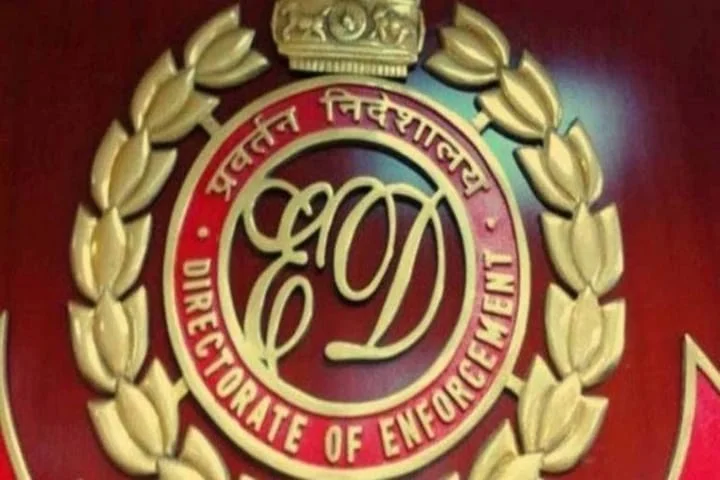

The ED charge sheet filed in the Special PMLA court in Raipur, did not disclose the identities of the alleged recipients of the proceeds, referring to them as "political executives"
Raipur: The Enforcement Directorate (ED), investigating the liquor scam in Chhattisgarh, has revealed shocking findings in its charge sheet that out of the total Rs 2,161 crore involved, approximately Rs 776 crores were funneled to “political executives. The charge sheet also discloses that the accused had planned to replicate the corrupt scheme in neighbouring Jharkhand, but the investigation by the ED in that state prevented it from taking off.
In the more than 13,000-page charge sheet filed in the Special PMLA court in Raipur, the Enforcement Directorate did not disclose the identities of the alleged recipients of the proceeds, referring to them as “political executives.” The prime accused, Anwar Dhebar, brother of Raipur Mayor Aijaz Dhebar, refused to reveal their identities. However, the agency asserts that it has collected sufficient evidence to indicate that political executives were the beneficiaries.
The charge sheet, filed last Tuesday, names Anwar Dhebar, former special secretary of the excise department Arun Pati Tripathi who was the managing director of Chhattisgarh State Marketing Corporation Limited, businessmen Trilok Singh Dhillon and Nitesh Purohit, and Arvind Singh, an associate of Anwar Dhebar. All of them have been arrested and are now in judicial custody.
The ED charge sheet sheds light on the modus operandi of the scam and provides a flow chart detailing those allegedly involved in the syndicate responsible for operating the scam. According to the charge sheet, the syndicate collected illegal money through three different methods related to the sale of liquor, which they categorized into three parts:
Part A: Illegal commission charged from liquor suppliers on accounted sales of liquor in Chhattisgarh. The records seized, along with calculations by the Income Tax Department (ITD), show that approximately ₹169 crore was collected by the syndicate under this category during the financial year 2019-20 alone.
Part B: The sale of off-the-record, unaccounted country liquor from state-run shops. This was done with the active involvement of distillers, hologram manufacturers, bottle makers, transporters, manpower management, and district excise officials. It has been discovered that the syndicate sold country liquor worth around ₹384 crore throughout the state in 2019-20 without accounting for these sales.
Part C: Annual commission paid to allow distillers to operate in Chhattisgarh. IT analysis reveals that the syndicate collected ₹70 crore under this category in 2019-20 alone.
According to the charge-sheet, Anwar Dhebar managed the commissions from Part A and Part C, and he transferred the entire sum to political executives of Chhattisgarh through an Indian Administrative Service (IAS) officer. Anil Tuteja, who held the position of joint secretary at the Department of Commerce and Industry, misused his position to manage the syndicate’s affairs with the support of several private individuals.
The charge sheet alleges that he engaged in large-scale corruption through systematic extortion, bribery, and quid pro quo deals. It also mentions that a significant amount of illegal funds was collected in cash through a hierarchical network. At each level, a small percentage was taken as remuneration, and the remaining funds were transmitted upwards. Anil Tuteja operated at the penultimate level of this pyramid. The charge sheet further reveals that a major portion of the looted funds went to political executives, while some were used for election campaigns.
Anil Tuteja, a 2003 batch IAS officer, was questioned by the Enforcement Directorate. Fearing arrest, he approached the Supreme Court, which ordered that no coercive action be taken against him until the next hearing. The case is expected to be heard later this month.
The central agency’s charge sheet also discloses that Anwar Dhebar transported ₹80-100 crore in cash to Delhi and Mumbai using hawala channels. These funds were allegedly used for significant cash payments to the ruling party in the state to support election campaigns.
Regarding Anwar Dhebar’s intentions to replicate the same corrupt model in Jharkhand, the ED charge sheet confirms that he planned to implement the successful Chhattisgarh model of Part A and Part B collections. However, the operation was abruptly halted after three to four months due to the intervention of the ED.
During his visit to Chhattisgarh on Friday, Prime Minister Narendra Modi repeatedly mentioned the liquor scam in his public address, describing Chhattisgarh’s Congress government as an “ATM” for the Congress party. He also claimed that the Congress party’s rotational chief minister formula after 2.5 years could not be implemented in Chhattisgarh due to the money involved in the liquor scam.
Chief Minister Bhupesh Baghel countered these allegations by questioning why no action had been taken against the distillers who sold unaccounted liquor. He stated that the state excise department had issued notices to three distillers and suggested that if holograms were found without proper tax payments, they should be collected. He alleged that the real culprits behind the liquor scam, where it all began, were not being apprehended.
Prime Minister Narendra Modi interacted with members of the Indian diaspora here on Wednesday as…
The city of Hamburg in Germany is set to host the 11th edition of India…
The International Atomic Energy Agency (IAEA) has confirmed that two Iranian centrifuge production facilities, TESA…
The human rights department of the Baloch National Movement (BNM), Paank, has strongly condemned the…
In a major boost to India's coastal defence capabilities, the Indian Navy on Wednesday commissioned…
Volker Turk, the UN High Commissioner for Human Rights, on June 17 expressed concern over…